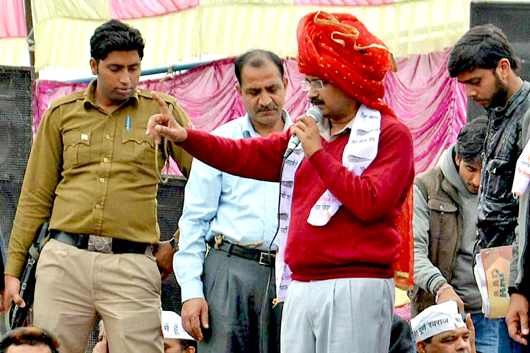
New Delhi, Feb 3: Exuding confidence that his party will come to power in Delhi, Aam Aadmi Party (AAP) chief Arvind Kejriwal today said the Bharatiya Janata Party (BJP) will reduce its Delhi CM candidate Kiran Bedi’s stature considerably, invoking former PM Manmohan Singh under Congress President Sonia Gandhi under IPA regime.
He also added that BJP has pressed the ‘panic button’ and was now resorting to ‘politics of poison’ to avoid a defeat.
Five days ahead of the voting to the 70-member Delhi assembly, Arvind Kejriwal predicted that Congress will not win even a single seat which will obviate the need for him to take that party’s support as he had done in 2013 to form his short-lived 49-day government.
The significance of election in Delhi went far beyond its borders and that was why the BJP was fielding its “big guns” for the campaigning, the former Delhi Chief Minister said in an interview.
“They have pressed the panic button and that is why you see all these big guns campaigning for the party,” he said and accused them of resorting to personal attacks against him, his family and the community he belongs to. “This shows their (BJP’s) desperation and frustration,” he said.
Referring to an attack on a South Delhi church this morning, he said this was in keeping with the pattern adopted by BJP in Uttar Pradesh where the electorate was polarised at the time of last year’s Lok Sabha elections and by-polls.
“This is what is the politics of BJP. They will try to polarise the society… We do politics of love and affection and they (BJP) do politics of poison,” he said.
Responding to Prime Minister Narendra Modi’s argument that it would be good to have a BJP government in Delhi which will work in tandem with BJP-led government at the Centre, he said he would work with Modi in a “constructive” spirit if his party comes to power.
On his rival chief ministerial candidate BJP’s Kiran Bedi, with whom he worked closely during Anna Hazare’s anti-graft agitation, Kejriwal said if she becomes Chief Minister, she will be like Manmohan Singh in the Congress party without a voice.
He also said that the former IPS officer was fit for police and not for Chief Minister’s post.
Kejriwal said he was sorry for Bedi as she has been “gagged” by the BJP.
Emphasising that it was “lives of Delhiites” who were facing corruption, high prices and issues of security which were at stake in this election, the 46-year-old bureaucrat-turned politician assured that like previous time, his party will reduce power tariff by half and come down hard on bribery.
Asked whether he will again resort to dharna if he becomes Chief Minister, Kejriwal said “If need be I will do it again.”
“Depending on the requirement of the situation, I will do anything — discussion, debate or struggle,” he said.
On the criticism that both he and Bedi used Hazare’s movement as “political launchpad”, he said it was for people to see that “one left chief ministership for Lokpal while the other one left Lokpal for chief ministership,” in an apparent dig at Bedi.
Kejriwal said there has been a groundswell of support for AAP as people of Delhi want the party to be back at power to address their problems and grievances.
“We are very confident of coming to power. People of Delhi want us to serve them. We have a clear roadmap to make Delhi a truly global city and ensure welfare of all sections of the society,” he said.
Asked about number of leaders including Shazia Ilmi leaving the party, Kejriwal said party has become stronger since the last elections as around 30,000 new volunteers have joined it in the last few months.
The former Chief Minister said if he comes to power, then his government will order through probe into finances of the private power distribution companies and initiate reform in the power sector.
He said enhancing women’s security and coming down hard on corruption will be his immediate priorities if he comes to power.





Comments
Add new comment